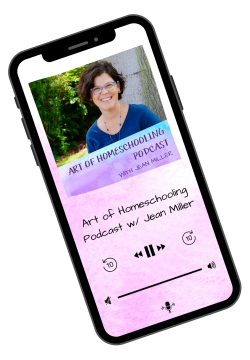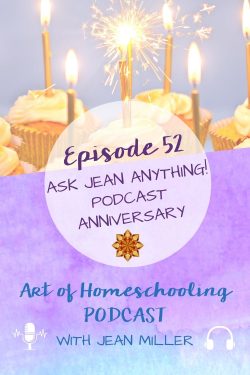Episode 52
I’m here to answer your questions, dear listeners! I’m celebrating the one-year anniversary of the Art of Homeschooling Podcast with an Ask Jean Anything episode!
Recording my podcast every week for the past year has really been fun for me! And I love that I’ve found a way to reach all of you out there on the homeschooling path.
I received so many wonderful questions about holistic, Waldorf-inspired homeschooling and parenting for this episode. More than I can answer in one go. So stay tuned for future episodes of the podcast.
Here in the show notes, you’ll find a short summary of each question and answer along with some key resources to explore further if you have some of the same questions and concerns as these homeschooling mamas.
Let’s dive in to this anniversary episode!

Ask Jean Anything from Amy:
What are some ways I can make my home more Waldorf inspired? We already have a daily and weekly rhythm, and a nature table. I would love to hear other ideas!
- Mealtime rituals can add to your family rhythm and culture, such as lighting a candle, joining hands, singing a song, and saying a blessing.
- Also, bedtime blessings, seasonal festivals, and the lively arts.
- Find more about weaving the lively arts into your daily rhythm, family culture, and homeschooling lessons here on Episode 23: Weaving the Lively Arts Into Your Lessons
Ask Jean Anything from Sara:
Are archetypes really that important to introduce? Don’t they perpetuate inequalities, injustices, and stereotypes from generation to generation? Can we introduce new archetypes (oxymoron, I know)?
- This is a complex question for sure! Archetypes are a part of character development in fairytales and storytelling. Stories that have been told since the beginning of time. They’re also an approach for exploring human behavior most notably by psychologist Carl Jung.
- At times, reading fairytales to our children can seem outdated and problematic. For example, when the prince rescues the princess. Actually, many archetypes are represented in these fairytales ~ the hero, the guide, the caregiver, the sage and more. Just like we are made up of a combination of the Four Temperaments, consider that all of the archetypes are held within each of us as well. The challenge is to nurture a balance of all the temperaments or archetypes.
- There’s a difference between an archetype and a stereotype. An archetype is a pattern of behavior or tendency on which a character is built or that influences a person’s development. A stereotype on the other hand is an oversimplified and often fixed representation of a character or person.
- Archetypes should never be used to perpetuate stereotypes. On the contrary, archetypes help us accept our differences and embrace the wholeness of humanity. We are all different and we are all the same!
Ask Jean Anything from Jackie:
I love the idea of rhythm yet I feel like it does not work with me because of how we enjoy spontaneous adventures as a family. We are full time RV travel living family. How can the idea of spontaneity play into our rhythm?
- You can have both a daily rhythm AND time for spontaneity! It’s never all or nothing around here.
- Try building in open blocks of time daily for free play or spontaneous adventures. Or choose one afternoon a week or even a whole day every week.
- Remember, rhythm is fluid, not fixed. If it flows maybe 85% of the time, it will always be there for you when you get out of sync, to guide you and hold you as a family.
- If you’re looking for help to create a flexible rhythm that supports your family, my free rhythm guide is called Homeschool Rhythm Starter Kit.
- Also check out Episode 3 of the Art of Homeschooling Podcast, Relax Into Your Homeschool Rhythm, one of my most popular episodes!
Ask Jean Anything from Rachel, Fiona, & Jackie:
Three moms had three very similar questions. Actually this is the most often asked question I get! How do I homeschool multiple ages?
- My first tip is to look at your family through the lens of community. And in order to build that sense of togetherness and community, we want to do as many of our daily activities together as we can. This will look different as your children grow and change. And you’ll need to be flexible to find what works. But homeschooling is about family and togetherness!
- Teach no more than two main lessons each day and find ways to combine your ages & grades. For example, Rachel could teach one main lesson each day with her first grader, and a second main lesson with her third and fourth graders combined. This may mean that you don’t teach all the recommended blocks or units each year, but there are many ways to be creative with this approach.
- Trying to teach one-on-one to each child every day is a recipe for mama burn out!
- Find a mantra or inner work verse to help you approach challenges with patience and acceptance. For example, “Wherever my child is right now is exactly where he (she) needs to be in order to learn what he (she) needs to learn for what comes next.”
- Read more about a day in life of a holistic homeschooler with multiple ages here, Holistic Homeschooling: A Day in the Life, and listen in as I chat with one mama as we discuss creative ways to approach learning together as a family.
Ask Jean Anything from Evgania:
What to do if my child says; “I don’t want to do it, I don’t want to learn that.” For example math or writing.
- Yes, this resistance can be tricky! Because we don’t want to turn into a heavy-handed authoritarian, ignore our child’s feelings, or turn the situation into a power struggle. But we also don’t want to just give up on the lessons or skills either.
- The best way forward starts with acceptance. Of ALL the feelings.
- Starting with acceptance can allow us to step back and observe our child more objectively. And to consider what’s going on for them. Is the work too easy? Too hard? Are they exhausted? In need of attention or support in ways we’re not seeing?
- After accepting and observing your child and the situation, it’s best to respond in as neutral a way as possible. Something like “I hear that you don’t want to do this. But this is what we have planned for this morning. Right now, I get to choose what we do together. And later, you get to choose.” The key is to adjust and experiment but never give up.
- I know it’s easier said than done! We talk a lot about resistance and acceptance in my mentorship community, Inspired at Home. You get support from me and fellow homeschoolers through coaching, classes, and community here.
Ask Jean Anything from Jackie:
Everything I read about Waldorf suggests not to use technology in the home. We are a technology loving family and use screen time a lot in our family. What are your thoughts on screen time and healthy limits?
- Another question I often hear and such a difficult one to navigate in these modern times.
- My approach is not anti-screens but pro-connection. Now, I didn’t make that up! It comes from the work of Kim John Payne and the Simplicity Parenting movement. This idea provides a foundation for why to consider limits on screen time. And encourages opportunities for connection each and every day ~ connection with nature, family, friends, and to self. Focusing on connection draws our attention away from focusing on the negative aspects of screen time or worry about the harmful effects. I encourage you to find what works for your family.
- I recommend Better Screen Time as a great resource for making decisions with and for your family.
- Also, check out my Ultimate Guide to Wholesome Media Choices for Children.
Dear listener, I appreciate you so much!
Thanks for tuning in!
It’s been an amazing first year of the Art of Homeschooling podcast!?
Rate & Review the Podcast
If the Art of Homeschooling Podcast has inspired you, I’d LOVE it if you could rate and review the podcast on your favorite podcast player! Reviews can be left on Apple Podcasts (iTunes), Podcast Addict, or Stitcher.
Or simply pop on over to lovethepodcast.com/artofhomeschooling and choose where you want to leave your review.
And if you want to show your appreciation for the Art of Homeschooling Podcast, you can buy me a coffee!
Never Miss an Episode!
 Listen & Follow:
Listen & Follow:
Check Out All the Episode Here (<<<Click that link!)
Save or share this encouragement on Pinterest with the image below.



